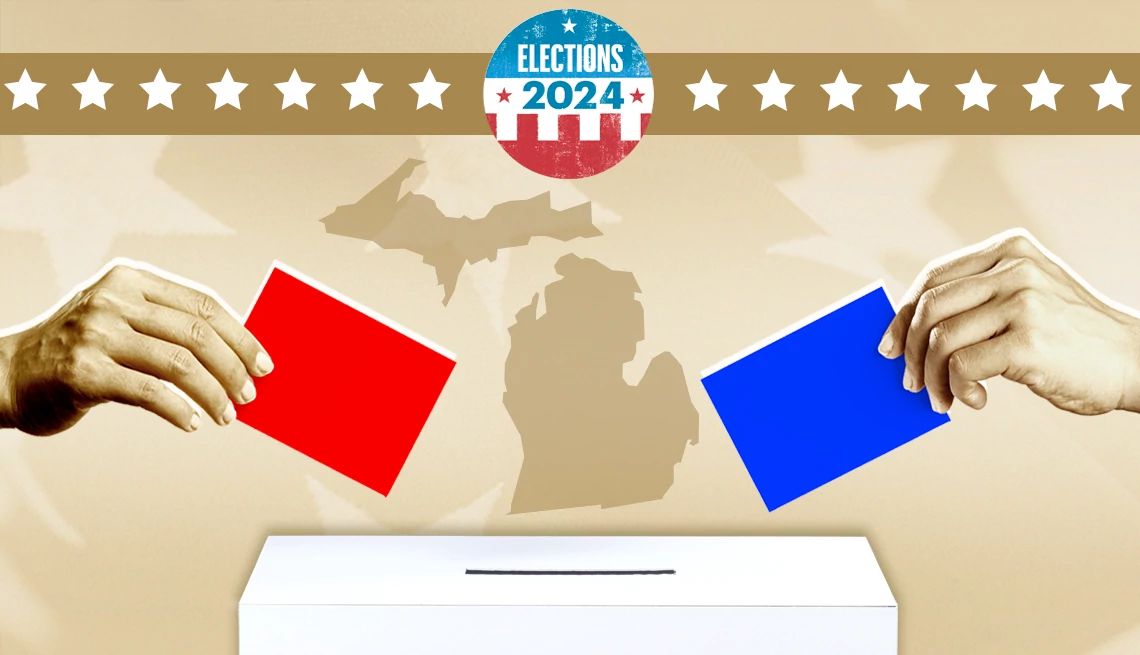AARP Eye Center
New AARP Michigan Poll: Presidential and U.S. Senate Races Neck and Neck

Today, AARP Michigan released its second 2024 statewide election survey, finding that candidates should pay close attention to Michiganders ages 50 and older, who make up an outsized portion of the electorate. Ninety percent of voters ages 50 and older say they are “extremely motivated” to cast a ballot in November.
Former President Donald Trump (R) and Vice President Kamala Harris (D) are tied among voters overall at 46%, with 5% of voters supporting a third-party candidate and 2% undecided. Trump has a slight lead in a head-to-head matchup, 49% - 48%. Among voters 50 and older, Trump holds a 1-point lead over Harris, with Trump up among 50-64-year-olds by 11 points and Harris ahead among voters 65 and older, also by 11 points. There is a clear gender gap: Harris is ahead by 19 points among women overall and by 12 points among women 50 and older, while men overall favor Trump by 21 points and older men favor him by 17 points.
In the U.S. Senate race, Rep. Elissa Slotkin (D) holds a narrow lead over Mike Rogers (R), 49% - 46%, among voters overall, with 5% undecided. Among voters 50 and older, Slotkin leads Rogers, 48% - 46%, with 6% undecided. Slotkin is ahead by 20 points among women overall and 16 points among women 50 and older, while men overall favor Rogers by 18 points and older men support him by 15 points.
“Michigan voters ages 50 and older are the largest voting bloc in the state, and this poll makes clear that they are not locked in for either candidate in the presidential or senate race,” said Paula Cunningham, State Director, AARP Michigan. “While Trump holds a wide lead among voters ages 50-64, Harris matches that lead with voters over 65, making the race extremely close. If candidates want to win, they should focus on the issues that matter to older voters, from protecting Social Security to supporting family caregivers.”
Eighty-two percent of voters ages 50 and older report that candidates’ positions on Social Security are very important in deciding whom to vote for in November, followed by Medicare (73%), helping people stay in their homes as they age (68%), and the cost of utilities (66%). And the vast majority (81%) of older Michigan voters prefer a member of Congress who wants Medicare to continue negotiating for lower prescription drug prices.
Other key takeaways from the poll among voters 50 and older include:
- Sixteen percent of older voters are swing voters – those who do not vote straight ticket Republican or Democrat – and among this group, Trump is ahead by 12 points and Slotkin is ahead by 10 points.
- Immigration and border security (33%) is the most important issue when deciding who to vote for in November, followed by inflation and rising prices and the economy and jobs (both at 24%).
- Fifty-seven percent cite at least one personal economic issue – inflation and rising prices, the economy and jobs, and Social Security – as most important to them.
- 62% of older voters say Social Security is or will be a major source of their income.
- Twenty-nine percent of older Black voters in Michigan cite Social Security and Medicare together as the most important issues, above immigration, inflation, and jobs.
- Thirty-one percent of older voters identify as family caregivers, making up 17% of voters overall. Thirty-five percent of older Black voters and 33% of older swing voters identify as family caregivers.
- This is an extremely competitive group, with Trump holding a 4-point edge over Harris and Slotkin leadings Rogers by 1 point among older family caregivers.
AARP commissioned the bipartisan polling team of Fabrizio Ward (R) & Impact Research (D) to conduct a survey of voters in Michigan. The firms interviewed 1,382 likely voters, which includes a statewide representative sample of 600 likely voters, an oversample of 470 likely voters ages 50 and older, and an additional oversample of 312 Black likely voters age 50 and older. The survey was done between October 2-8, 2024. The interviews were conducted via live interviewer on landline (25%) and cellphone (35%), as well as SMS-to-web (40%). The sample was randomly drawn from the Michigan voter list. The margin of sampling error at the 95% confidence level for the 600 statewide sample is ±4.0%; for the 800 total sample of voters 50+ is ±3.5%; for the 400 total sample of Black voters 50+ is ±4.9%.
View the full survey results at aarp.org/MIpolling and find all of our state battleground polls at aarp.org/voterpolls24. Read AARP’s coverage of the poll here.
For more information on how, when, and where to vote in Michigan, visit aarp.org/MIvotes.

































































